Setting up your Sunsama account
What to expect when you first sign up for Sunsama
Signing up
Visit https://sunsama.com and click the "Sign Up" button to get started. You’ll then be directed to start your 14-day free trial by logging in with your Google or Outlook account.
Right now, you must create an account using a Google or Outlook account in order to integrate calendars and emails. Once you create your account, you can set up an email/password sign in by generating a password from here. It's best to follow this link in a private or incognito window.
Starting your trial
After logging in with your Google or Outlook account, you’ll be directed through a one-time onboarding and planning flow unique to a first time user.
The purpose of this guided onboarding flow is to properly set up your workspace and introduce you to the core features of Sunsama. It’s necessary to complete all of these steps to gain access to your Sunsama workspace. You can always change any of the settings you pick later on.
Guided onboarding flow
Pick your task management tools
Let Sunsama know what other task management tools you use day-to-day.
First, we’ll ask you which of the integrated tools in Sunsama you use. You will connect your accounts from those tools later on when you plan your first day, and can always add more at another time.
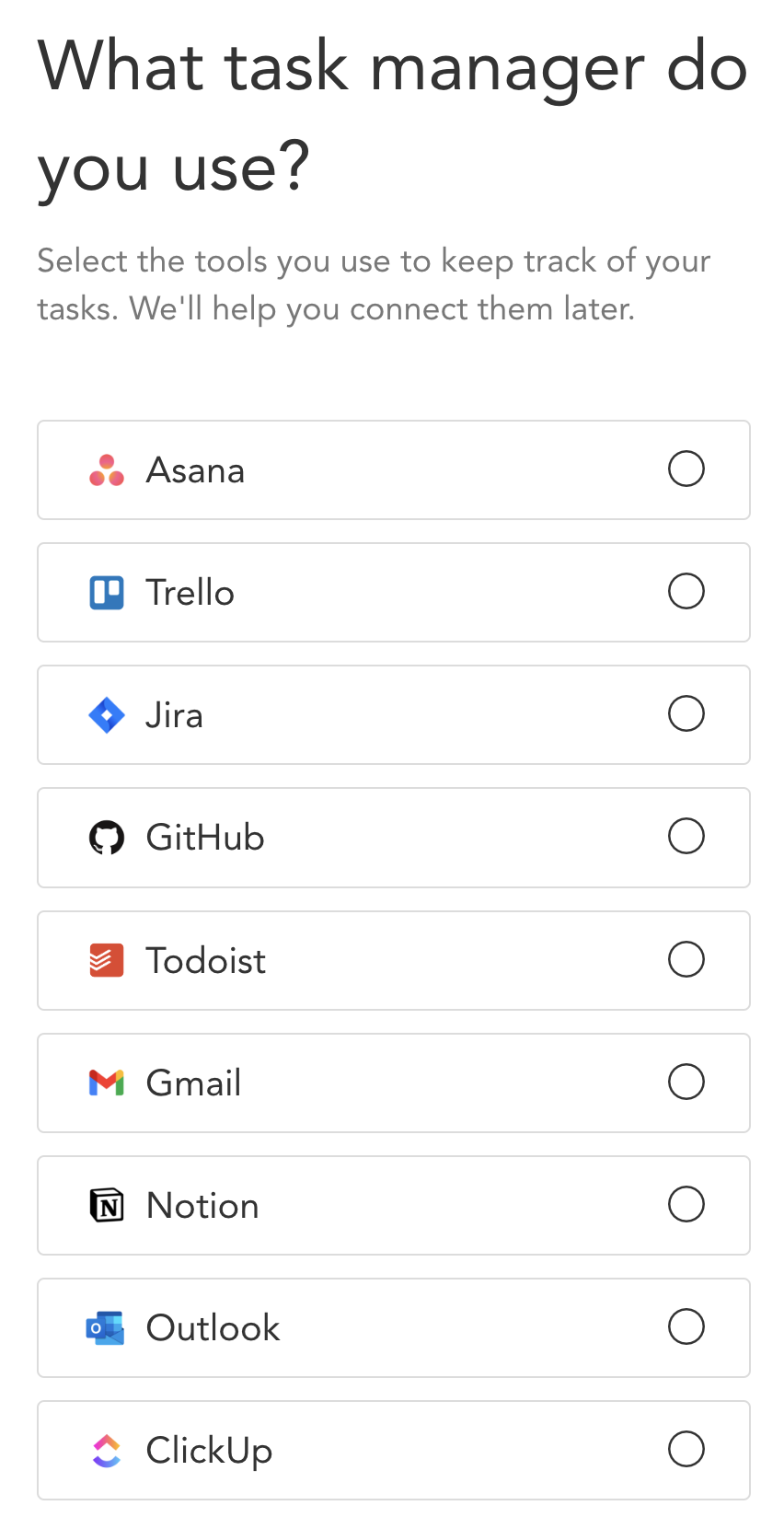
Connecting your calendars:
Link your calendar accounts, if you haven’t already.
Next, we’ll ask which of the calendars in the Google or Outlook account you used to sign up with you use on a daily basis.
Sunsama uses your Google and/or Outlook calendars so you can timebox tasks to the calendar and create tasks from existing calendar events such as meetings. You can add as many Outlook and Google calendars as you want, and later you’ll be able to configure which tasks go to which calendars based on channels, giving you complete control over your timeboxing experience.
For more information, go to our page on Calendar Settings.
When do you plan your day?
Pick the time that you want Sunsama to remind you to plan each day.
Sunsama walks you through the process of planning your day everyday. You can tell Sunsama what time to initiate your daily guided planning.
When your planning time arrives, you’ll receive your daily email reminding to plan your day (during your 14-day free trial only), and your Sunsama app will automatically transition to the guided planning flow.
What time you should select:
- If you like to plan your day the morning of, you should pick a time before 3 PM. It’s best to pick a time before you’ll reach your computer.
- If you like to plan your day the night before, you should pick a time after 3 PM. It’s best to pick a time where you’ll be wrapping up for the day, since planning for tomorrow should be the last thing you’ll do that work day.
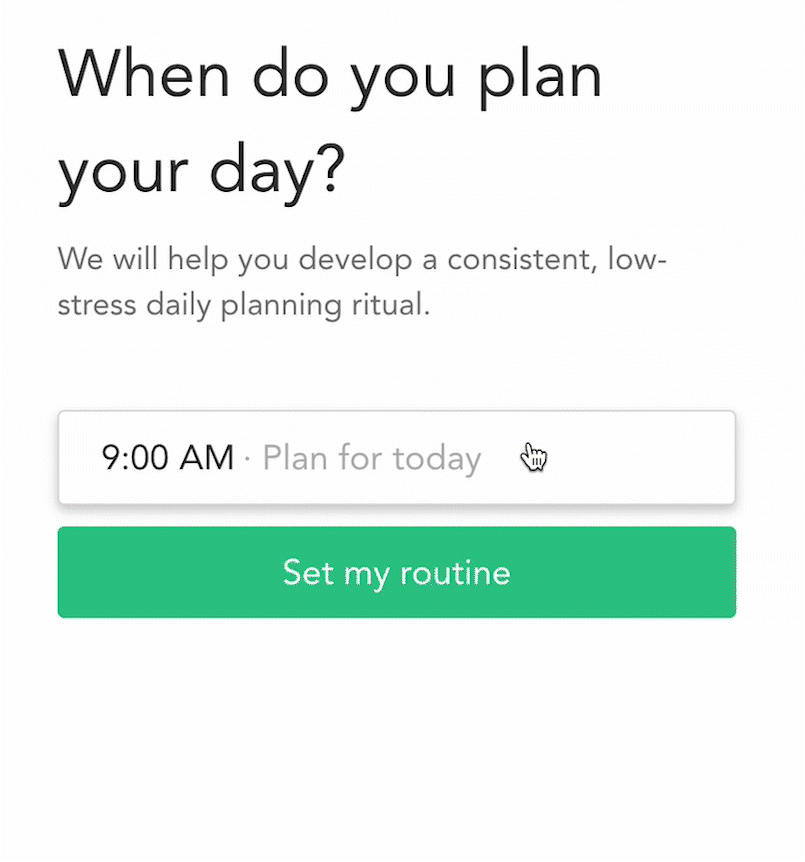
You can change your daily planning time later in your Account Settings.
If you’re curious about evening planning (planning for tomorrow rather than today), please refer to our guide on evening planning.
Planning reminders
Select if you’d like daily desktop notifications or just the emails.
Sunsama helps you build and maintain your daily planning habit. In order to to help you build this habit we offer two options for daily reminders during your trial. If you select the top option, you’ll get a desktop notification along with your daily email. If you select the second option, we’ll only remind you to plan your day with the daily email during your trial.
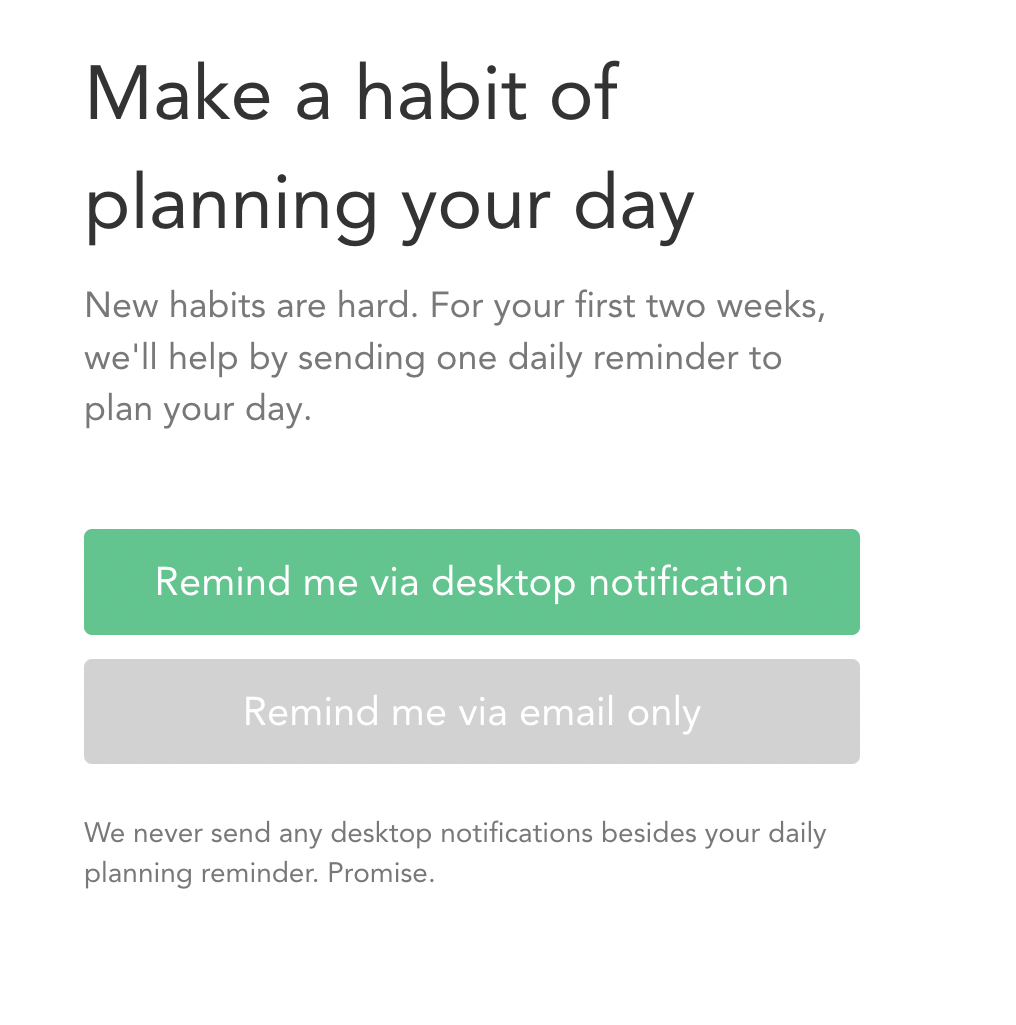
Guided Daily Planning flow
Next, you’ll go through Sunsama’s guided daily planning process of reflecting on a day and planning a day in Sunsama.
The guided planning flow you’ll see today will be slightly different than a normal daily planning flow. For your first time today, we’ll show you a custom version that’s best suited for you to learn how to use Sunsama and understand the principles of daily planning.
You must to go through all of these first-time planning steps before you can make it to the main Workspace View. Then you’ll have full control over your Sunsama.
In order to proceed past each step, you’ll need to follow the instructions listed in the left hand panel of each step. If you ever get stuck, read those instructions or hit “Next”, “Continue” or “Get Started”.
- If it’s before 3 PM, when you start this flow, you’ll be asked to review yesterday’s work and then plan out today.
- If it’s after 3 PM, you’ll be asked to review today’s work and then plan out tomorrow.
In this example on this page, we’ll show you what happens if it’s before 3 PM. If you are doing it after 3 PM, you’ll be asked to reflect on the day that has just passed (today) and asked to plan the next day (tomorrow).
Yesterday in review
First, we’ll ask you to reflect on yesterday by writing down something you worked on. We’ll also ask you to input how long you spent on that task.
When you add time spent to the task, you’ll start to see your daily analytics add up on the left hand side.
If you did more than one task, you can add those in and see your daily analytics change. You can always add more later.
Click “Next” to advance. More info on this step here.
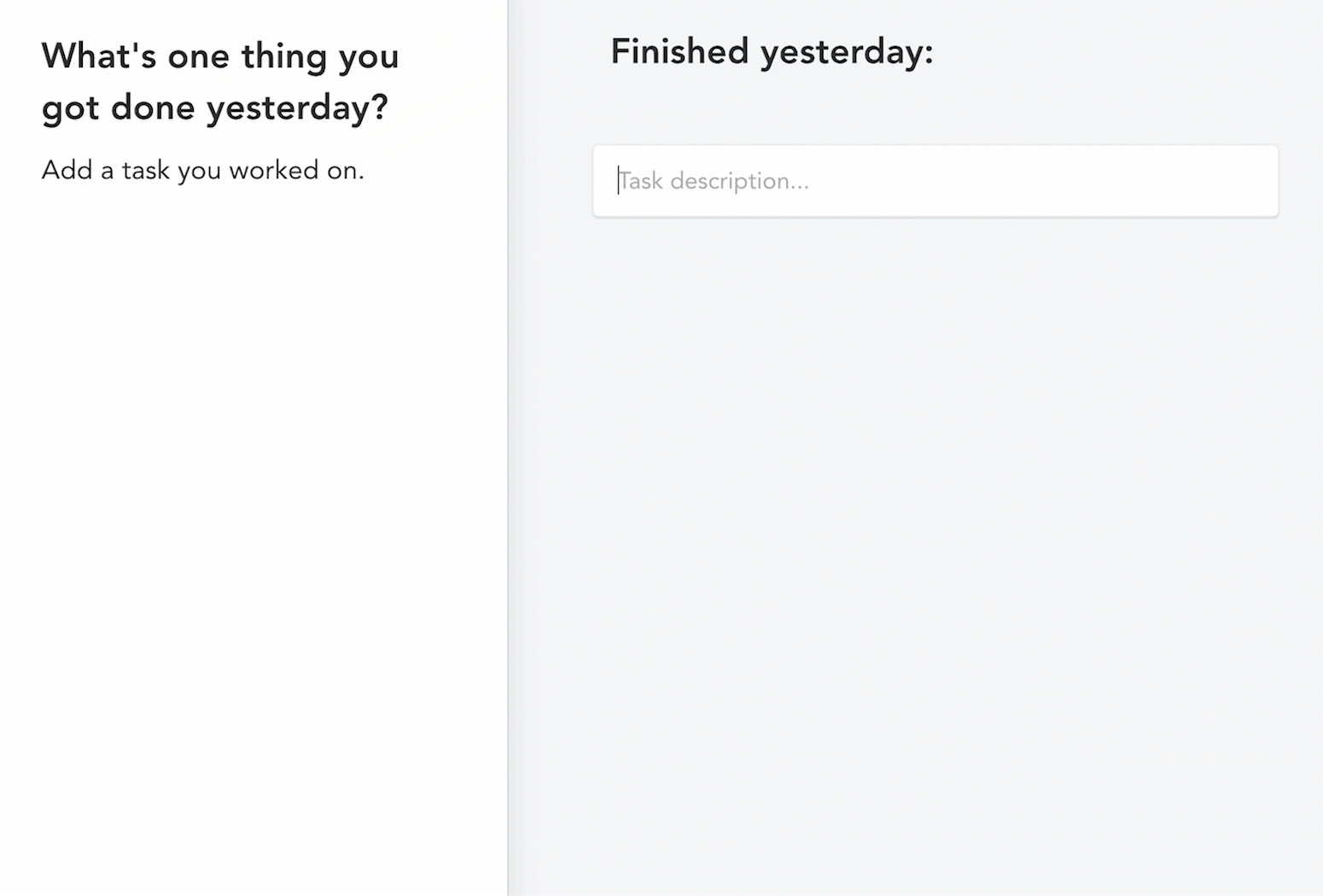
This first step of the daily planning flow is to reflect on what you did on your last day. This helps you to appreciate all your hard work and see how much you got done. It also helps you understand what didn’t get done, what took up most of your time, and which areas of your work and life you are spending your time.
In order to better understand how you are spending your time, you’ll be able to set “actual time” on a task. You can do that manually or by running a timer on a task. You can also categorize your tasks into channels and contexts.
Adding tasks for today
Next, we’ll walk you through a daily planning flow for the first time. You’ll begin by typing in three tasks you want to work on today. Then, we’ll ask you add time estimates for them. You can add more than three on this screen if you'd like. Click “Next” to advance.
More info on adding tasks here.
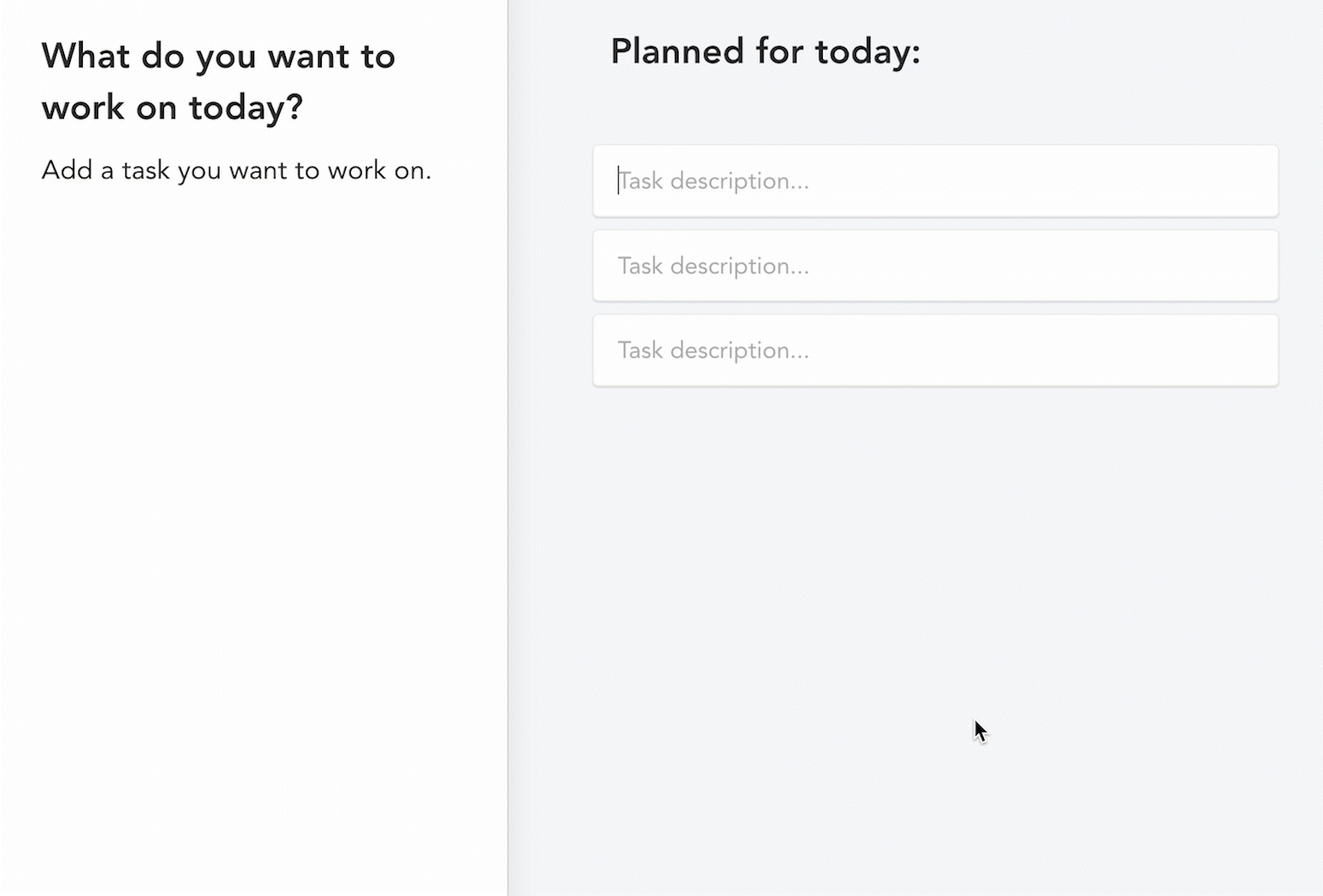
Sunsama is designed to help you focused on your most essential tasks for just today. You should think of this list as all the things you need to get done today. It’s important to add time estimates to each task, that way you’ll get a more realistic picture of whether what you are trying to today is actually feasible.
Later on, in your account settings, you’ll be able to configure your daily workload threshold and when you configure your contexts/channels you’ll be able to control which tasks count against your workload threshold or not.
This is where you should add tasks you want to work on today; it isn’t a place to add all the tasks you want to do someday. For tasks that don’t yet have a date associated with them, you can use the backlog or, better yet, use a different tool (such as Trello or Notion) to serve as your backlog and integrate that with Sunsama.
Fill in tasks from other tools
This next step allows you to add tasks from your other integrated tools. Click on the icon of the tool in the right hand panel. You will have to connect your respective accounts first. Then, simply drag an item from that integrated tool into today’s column. Click “Next” to advance.
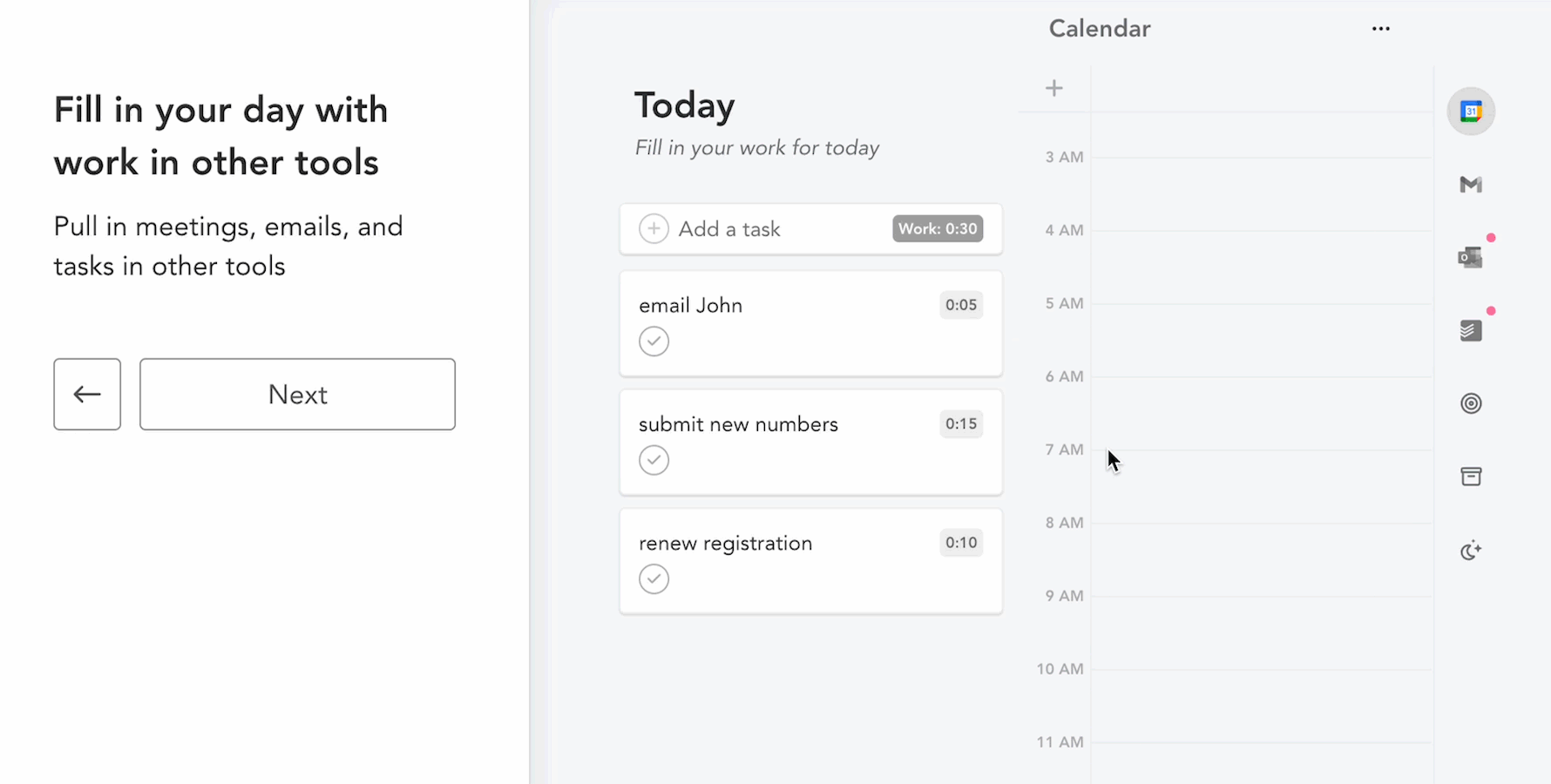
Sunsama’s integrations allow you to create tasks from items in your other connected tools, such as emails. This way, you don’t have to remember to check your other tools throughout the day, or create new tasks that simply reference another tool. You can create tasks from those very tools and include the content and notes therein. Tasks created from integrations will also have links back to those tools, so you can quickly navigate back to them. Additionally, the integrations have built-in automations that you can set up, so that upon importing or completing a task, that item is updated according to your preferences back in its respective tool.
For more information, please refer to the various guides on our integrations in this help center.
Push back non-essential tasks
In this step, you can easily bump back tasks you won’t be able to work on today. Simply drag a task to the Tomorrow or Next Week column. Click “Next” to advance. More info on this stage here.
If you want to move a task to a day that’s not shown here, you can do that by clicking the calendar icon on the task card and selecting any day.
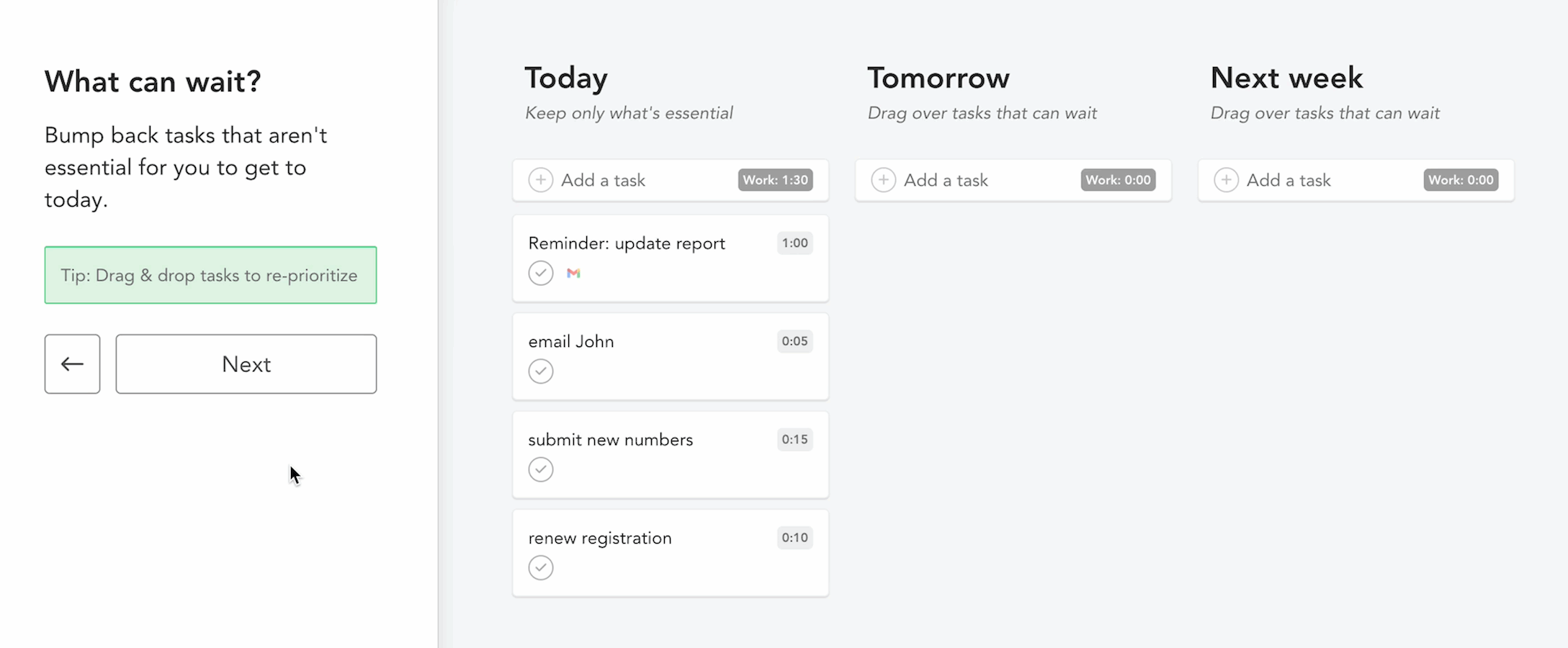
Sunsama will help ensure that you aren’t trying to do more work than is reasonable. Later on, you can set up your workload threshold so Sunsama knows how much time you should be working each day. Sunsama will softly caution you if you have planned too much work for the day or if you’re overcommitted, according to your settings. In order for this to work well, you should always add time estimates to your tasks no matter how big or small they are, and make sure to import all your meetings into your task list. If your tasks are lacking time estimates, Sunsama will warn you of an unpredictable workload.
Finalize your plan
Use this step to reorder the list of your tasks for today in the order you wish to work on them.
If you want to get a better idea of when you’ll work on things relative to the other meetings and obligations on your calendar, you can timebox the task. Timebox tasks by dragging and dropping them onto the calendar, or by hovering over a task and hitting the keyboard shortcut “x” to autoschedule it.
Once you’ve ordered your task list, set your Shutdown time. This is the time when Sunsama will prompt you to shutdown for the day.
You can snooze or dismiss the shutdown prompt when it arrives at the scheduled time.
Click “Looks good” to advance. More info on this stage here.
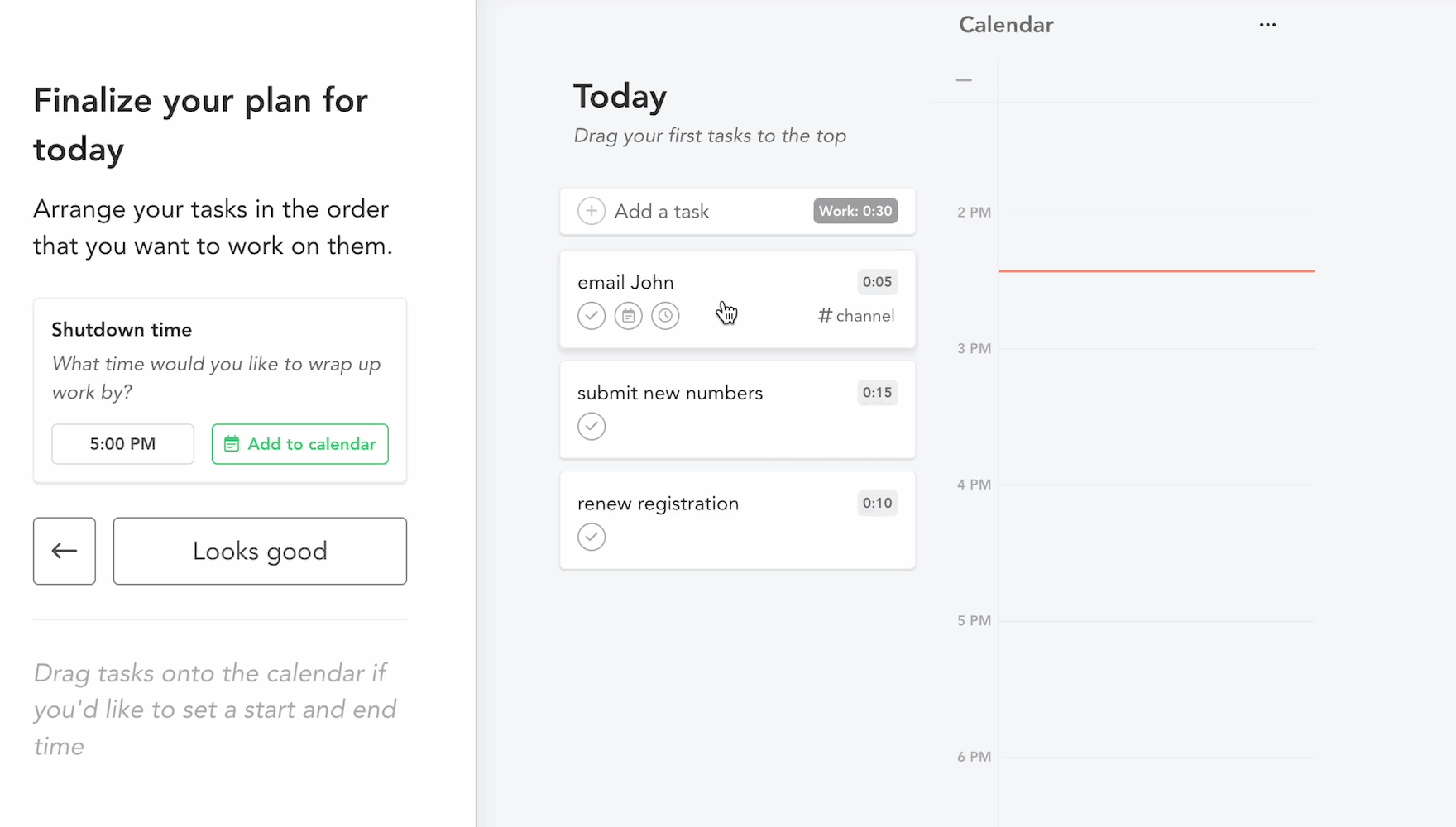
When you timebox your tasks, you’re creating calendar events from those tasks. You’ll be able to control what calendar these events are created on, the privacy of these events, and other settings later on.
If you use the auto-schedule feature to timebox your tasks, Sunsama will place the tasks on the calendar for you, according to your schedule settings and around existing events on the calendar.
Share your plan and Get Started
In the final stage of daily planning, you’ll see a list of your tasks for the day in front of you. Take a moment to jot down any obstacles you may anticipate facing. Optionally: share your plan to a connected Slack channel.
More info on this stage here.
Finally, click “Get Started” to complete the planning flow.
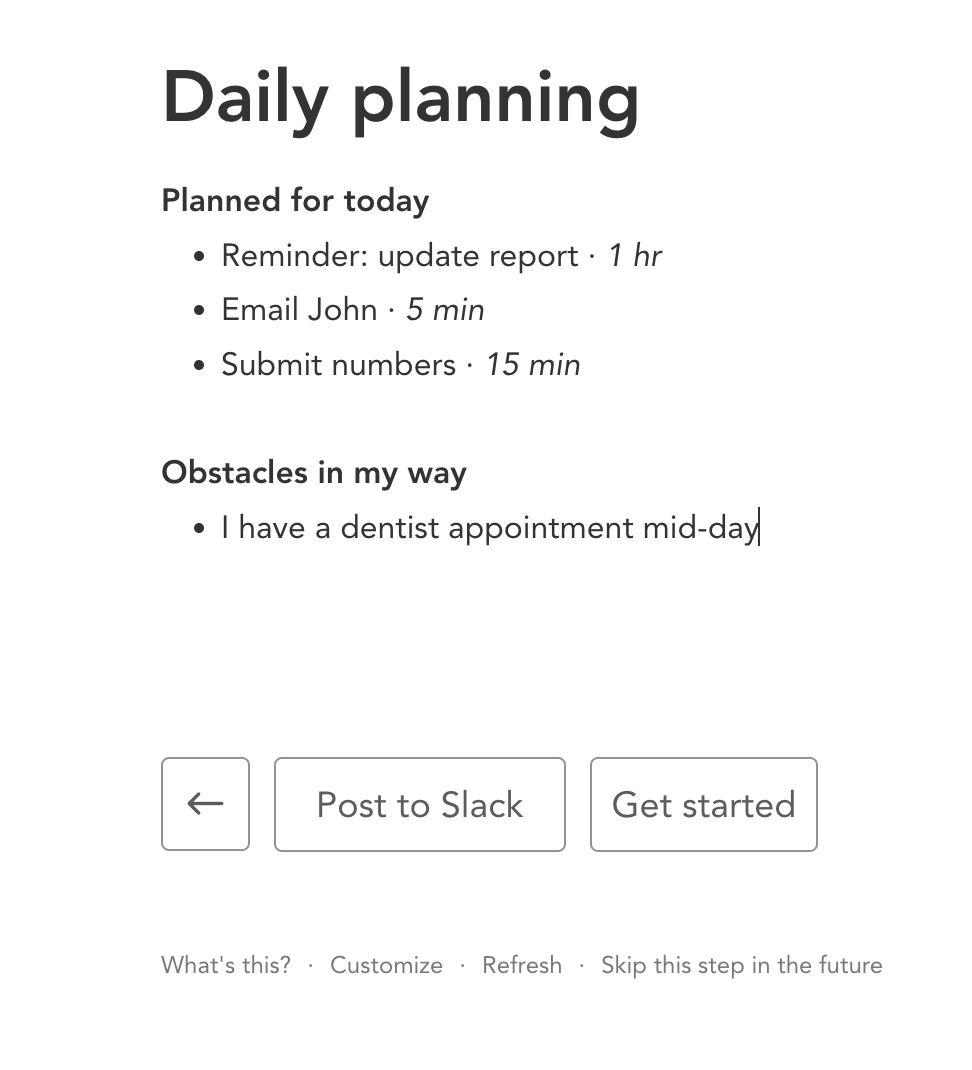
When you arrive on this page, you'll see an auto-generated summary of the plan you just created in the main text editor. You can directly edit the displayed text, or click “Customize” to change what’s automatically generated in your list.
If you don't have teammates to share your summary with, or you don't care to jot down obstacles or other notes here, you can click the "Skip this step in the future" option at the bottom to forever skip this step as part of daily planning.
The purpose of this step is two-fold. Firstly, for you to take in your plan for the day one last time and note to yourself what the day holds and what stands in your way. Secondly, if you use Sunsama with a team and use Slack, you can share this plan to your colleagues so they’re aware of what you’ll be working on today.
Workspace View
Once you’ve completed the first time guided daily planning, you’ll arrive at the main workspace view of Sunsama with your Daily Kanban. You can now use Sunsama as you wish, and can manage your tasks, explore your various settings, and set up your integrated tools.
You’ll go through the guided daily planning flow at your next scheduled daily planning.
Onboarding resources and emails
Once you’ve begun using Sunsama, you’ll get a brief email each day with advice and reminders during your trial period.
If at any point you have questions or need help, please reach out to us or refer to this help center for more information about various features. You can write to use directly using the support chat bubble in the bottom right corner of the app. We always respond to those messages within one business day.
Updated 2 months ago